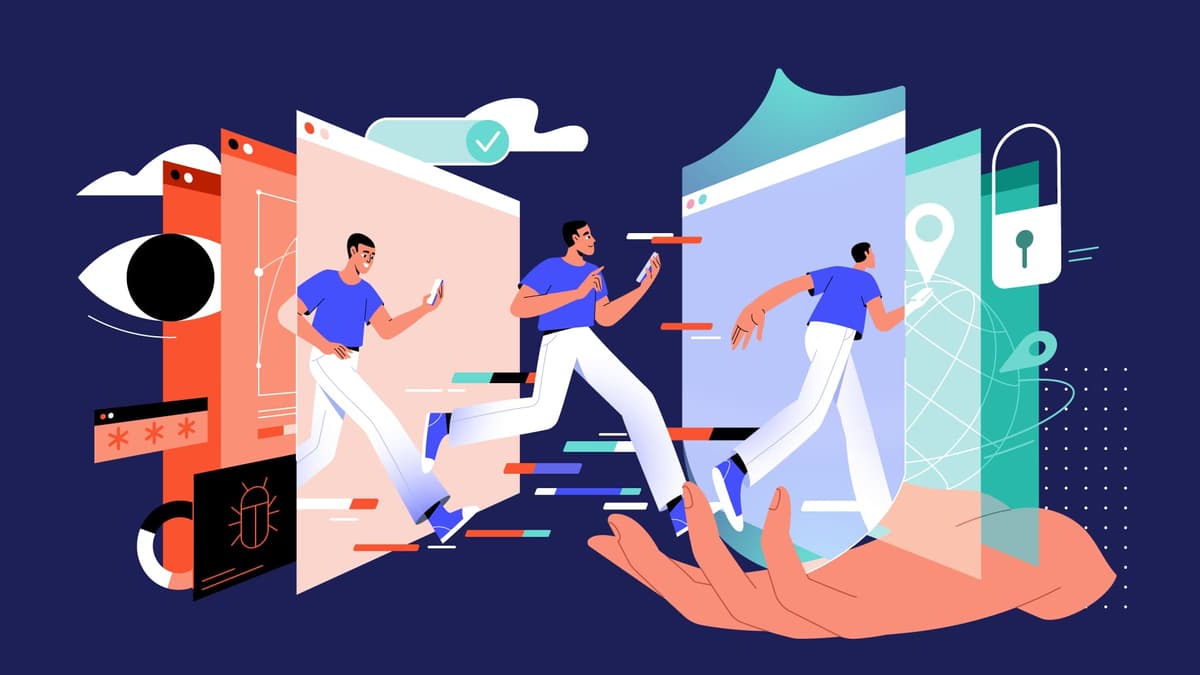Top10VPN is editorially independent. We may earn commissions if you buy a VPN via our links.
Does a VPN Use More Data?
The Short Answer
Our tests showed using a VPN on your cell phone increases mobile data usage by up to 20%. The most efficient VPN protocol is WireGuard, with a data overhead of less than 5%. While VPNs work well with mobile data, you can’t use one to bypass monthly data caps or get unlimited data.
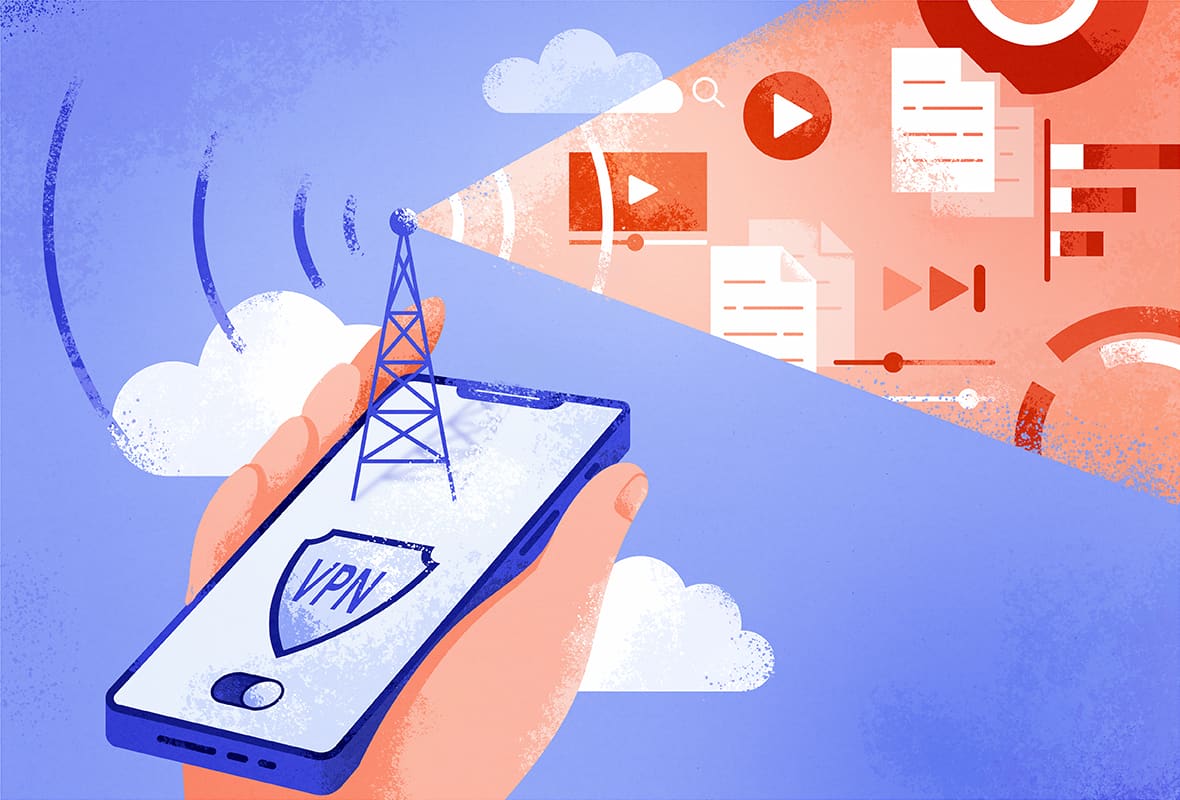
If you use a virtual private network (VPN) application on your smartphone, it will encrypt your cellular data to create a private and secure mobile internet connection.
A VPN therefore prevents cell phone carriers, such as Verizon Wireless, from tracking your online activity and lets you access websites and services that are usually inaccessible from your location.
Mobile VPNs are widely available on both Android and iOS devices. These applications secure your traffic when you’re connected to WiFi networks, and when you’re using your phone’s cellular data (e.g. 5G and 4G).
But how does using a VPN on your smartphone affect its data usage?
VPN Data Usage Test Results
Browsing the internet with a VPN uses more mobile data than not using a VPN.
We can also confidently tell you exactly how much more data a VPN uses as we’ve performed a rigorous experiment to measure how much extra bandwidth each VPN protocol consumes compared to a standard internet connection.
According to our VPN data usage tests, a VPN increases your data consumption by anywhere between 4% and 20%.
This data consumption increase depends on a number of factors such as which VPN protocol you use. This is known as the VPN or encryption ‘overhead’.
Over time, the overhead can really add up. A two-hour Netflix film streamed in high-definition without a VPN will typically consume about 6GB of data. With a VPN, this could rise as high as 7.2GB.
For users with a mobile data cap, using a VPN will mean you consume your monthly allowance quicker. For travelers, it could mean you pay more for data roaming than you would otherwise.
Here is a brief summary of how the VPN overhead may impact the data usage of different online activities:
| Activity | Without VPN | With VPN (4% overhead) | With VPN (20% overhead) |
|---|---|---|---|
| Web browsing (per web page) | 1,917.5 KB | 1,994.2 KB | 2,301 KB |
| Standard Definition (SD) Netflix Video (per hour) | 0.7 GB | 0.728 GB | 0.84 GB |
| High Definition (HD) Netflix Video (per hour) | 3 GB | 3.12 GB | 3.6 GB |
| Ultra HD Netflix Video (per hour) | 7 GB | 7.28 GB | 8.4 GB |
EXPERT TIP: To calculate how much data a VPN will use, consider your activity’s data usage without a VPN and then multiply it by 1.04 (for a 4% overhead) or 1.2 (for a 20% overhead).
The reason why a VPN increases cellular data usage comes down to the way information is transmitted across the internet.
When you send and receive data over the internet, it gets divided into ‘packets’. Each packet can only hold a certain amount of data (typically ~1,500 bytes, which is equivalent to ~1,500 plaintext characters).
A packet doesn’t just contain the data you’re downloading or uploading (known as the ‘payload’), though. It also has to save room for information about where the payload has come from, where it’s going, and the internet protocol (IP) version being used.
This information is stored in the IP header, and it requires at least 20 bytes of space in the packet. That means 20 bytes less space for your payload data.
When you use a VPN, the original packet is encrypted and wrapped in a separate packet (with separate headers) in order to route it to the VPN server. As you can imagine, this further reduces the amount of space in the packet for your all-important payload data.
Consequently, a file that would’ve fit nicely into one packet might have to be split up and sent in two packets when a VPN is being used. That is how a VPN causes a 4-20% increase in mobile data usage compared to not using a VPN.
Here’s a illustration of how the payload data is reduced in VPN vs non-VPN packets:
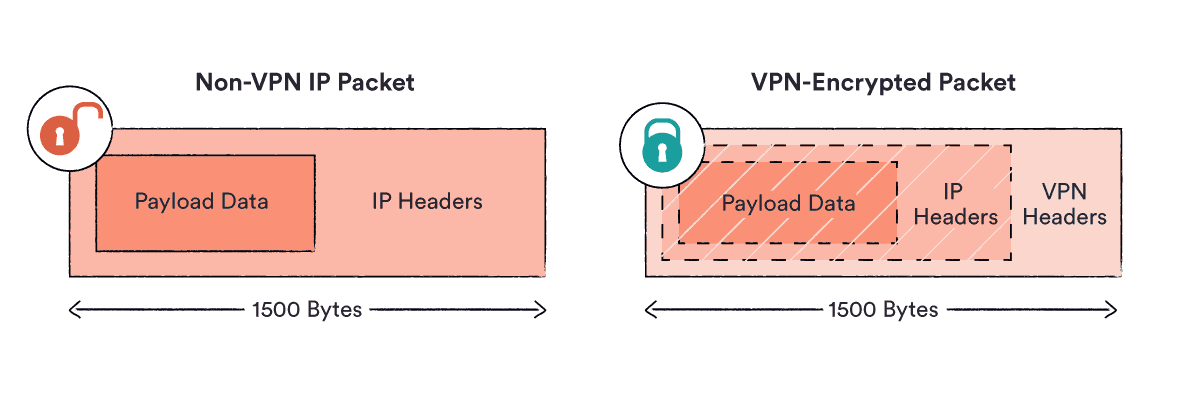
EXAMPLE: An image file that’s 2,960 bytes long fits perfectly into two normal (non-VPN) packets (1480 x 2) with their IP headers (20 x 2). But, when sending the image file over a VPN connection, the additional space taken up by the VPN header pushes the image file into a third packet. This requires an additional VPN header and an additional IP header, increasing the overall data consumption of the file.
VPN Data Usage Explained
To understand why VPNs use data, we need to look at how a VPN works.
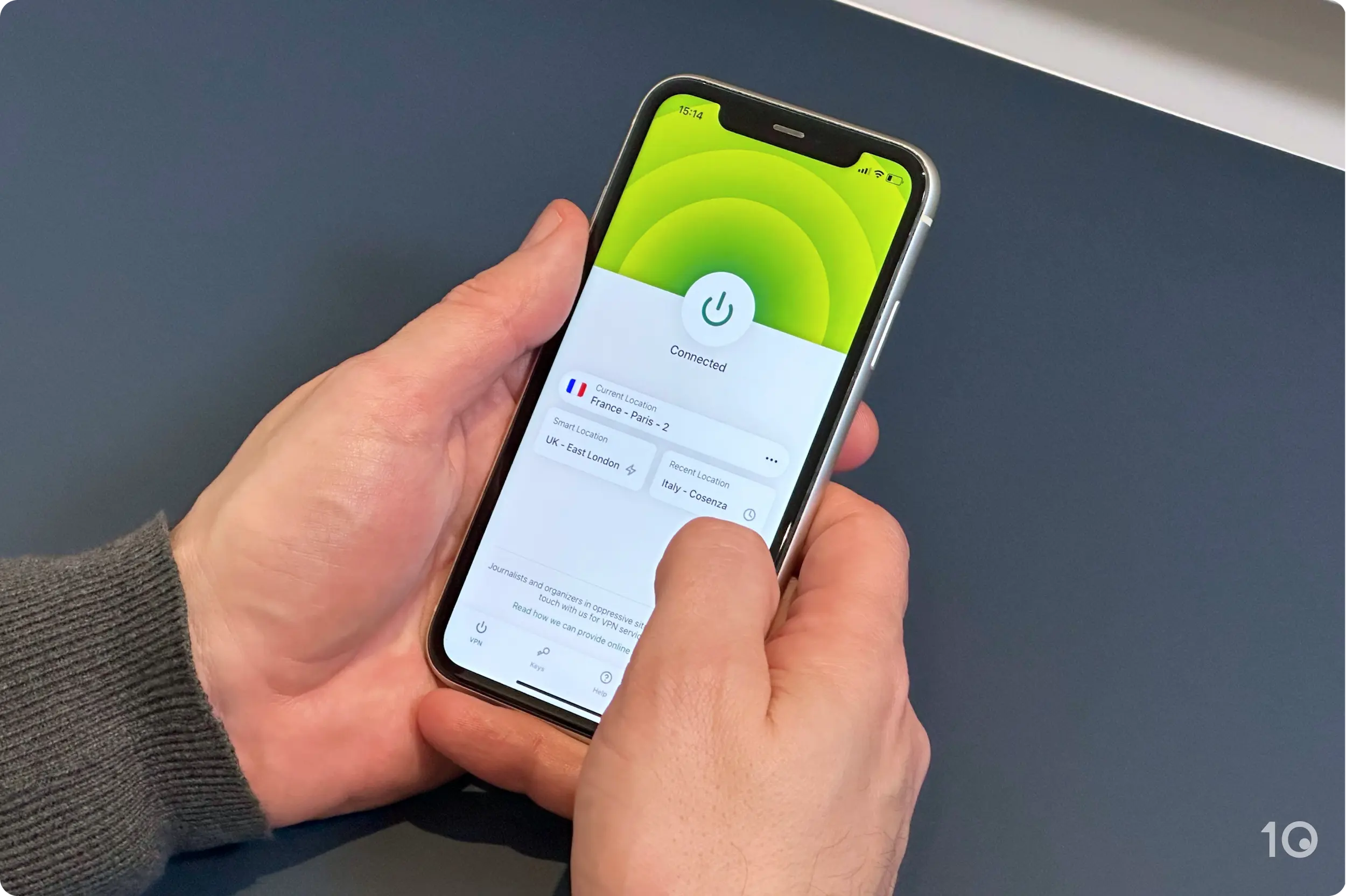
Using ExpressVPN’s app on our iPhone.
When you use a mobile VPN app, your phone initially connects to a VPN server, rather than your desired website. The VPN server then connects to the website for you, and returns the information you want.
There are two main advantages to this:
- The VPN server shields your identity by hiding your IP address, so you can’t be traced.
- The server can be located in a different country. That means you can access content that is normally only available in that country, such as US Netflix if you’re outside the US.
A VPN also encrypts your data so that your mobile carrier cannot see the content of your activity.
Your mobile carrier can see you’re connecting to a VPN server, but not what you’ve instructed the server to do, or where your traffic is going from that point onward.
VPN connections still need an existing internet connection to work.
Your traffic still has to travel through your cell phone provider’s network infrastructure in order to reach the VPN server.
Here’s a diagram showing the difference between mobile internet connections with and without a VPN:
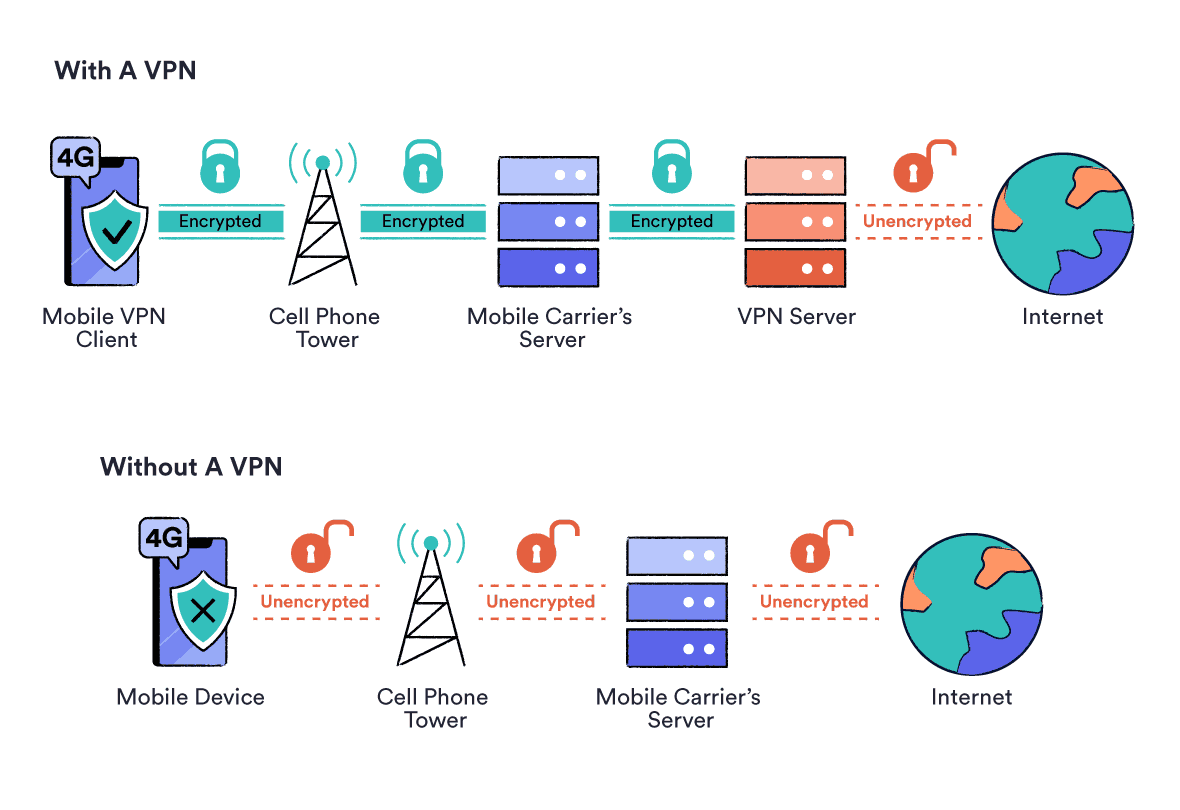
While they cannot see the details of the data traveling between your phone and the VPN server, mobile carriers can still measure how much data you are using and charge you accordingly.
As our tests showed, using a VPN actually leads to more data usage than not using a VPN, because of the ‘encryption overhead’.
Alternatively, see if a VPN can give you unlimited data to help you bypass your monthly data limit.
How to Reduce Your VPN’s Data Usage
There are several techniques to reduce the amount of data your VPN uses:
1. Choose the right VPN protocol
VPN protocols govern how the VPN client (e.g. your smartphone) communicates with the VPN server. Some are more data-efficient than others.
We tested five of the most popular protocols to calculate the size of their VPN/encryption overhead. Here’s what we found:
| VPN Protocol | Overhead | Our Verdict | Privacy & Security | Speed |
|---|---|---|---|---|
| WireGuard | 4.53% | Newest, fastest, and most efficient VPN protocol. We highly recommend WireGuard for data-conscious users. | High | Very Fast |
| IKEv2/IPSec | 7.88% | A good protocol for mobile users as it smoothly handles frequent network changes. Be cautious using it for highly sensitive data as IPSec may have been compromised by the NSA. | Medium | Very Fast |
| PPTP | 8.24% | Might be sufficient to evade soft data caps, but PPTP has weak and outdated security. Avoid unless absolutely necessary. | Low | Very Fast |
| OpenVPN UDP | 17.23% | We recommend OpenVPN as the most secure VPN protocol. UDP is faster than TCP, but is less stable. | High | Fast |
| OpenVPN TCP | 19.96% | We recommend OpenVPN as the most secure VPN protocol. TCP is slower than UDP and will consume slightly more mobile data. | High | Moderate |
NOTE: We also tested the effect of different key lengths (128-bit, 192-bit, and 256-bit) and different ciphers (AES and Camellia) on data use. Our results showed that these factors had very little impact on protocol overhead, despite frequent misleading claims to the contrary.
Generally, more data-efficient protocols are faster. For instance, WireGuard, IKEv2/IPSec, and PPTP are some of the fastest VPN protocols around.
It is also commonly assumed that more secure protocols will have larger encryption overheads. While this is generally true, WireGuard is considered secure despite being the most efficient. PPTP is less secure despite higher data consumption than IKEv2/IPSec, a safer protocol.
SUMMARY: WireGuard is the most efficient VPN protocol when it comes to mobile data usage. In our tests, it increased data consumption by just 4.5%. By contrast, the industry-standard protocol, OpenVPN, uses the most data. It has an overhead of 17%-20%, depending on which transmission protocol you use.
2. Turn off the VPN
It might seem obvious, but you can stop your VPN using data by simply switching it off.
We would usually recommend that you leave your VPN on all the time, because it’s an invaluable tool for fighting surveillance, protecting your privacy, and keeping you safe.
However, if you’re just using your VPN to occasionally unblock foreign Netflix libraries or protect your identity when torrenting, and data usage is an issue, it might make sense to turn it off when you aren’t engaged in those activities.
By only using the service when strictly necessary, you can avoid the VPN overhead and make your monthly data allowance last longer or avoid paying more in data roaming charges.
3. Use split tunneling
In fact, some VPN services offer a specialized feature to help you do just that. VPN split tunneling lets you specify which apps and services you want to route via the VPN connection and which you don’t.
For example, you might choose to protect your sensitive web browsing and email activity with the VPN, but route high-bandwidth activity like streaming and gaming outside of the VPN in order to avoid the overhead.
Not every VPN offers split tunneling, though. We recommend using ExpressVPN or NordVPN if it’s something that appeals to you.

You can turn on split tunneling in the ExpressVPN app under Preferences > General.
4. Enable compression
Many VPNs use compression to minimize data usage, particularly effective for image transfers. Check your VPN’s settings to ensure it’s enabled.
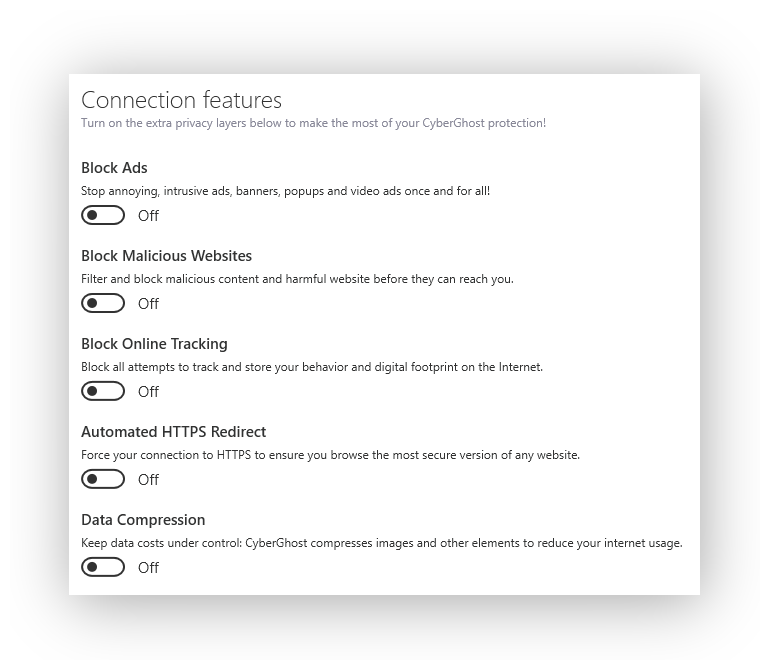
The effectiveness of compression varies depending on the content, but it’s worth using it if it’s available.
Does a VPN Give You Unlimited Data?
Using a VPN will not overcome your cell phone plan’s data limit or provide unlimited data. In fact, VPNs consume more data due to overhead.
VPN companies advertising ‘unlimited bandwidth’ or ‘no data cap’ refer only to their service, not your cell phone’s data limit. Premium VPNs typically offer unlimited bandwidth, but most free VPNs impose their own data caps. Proton VPN Free offers unlimited data for a free service.
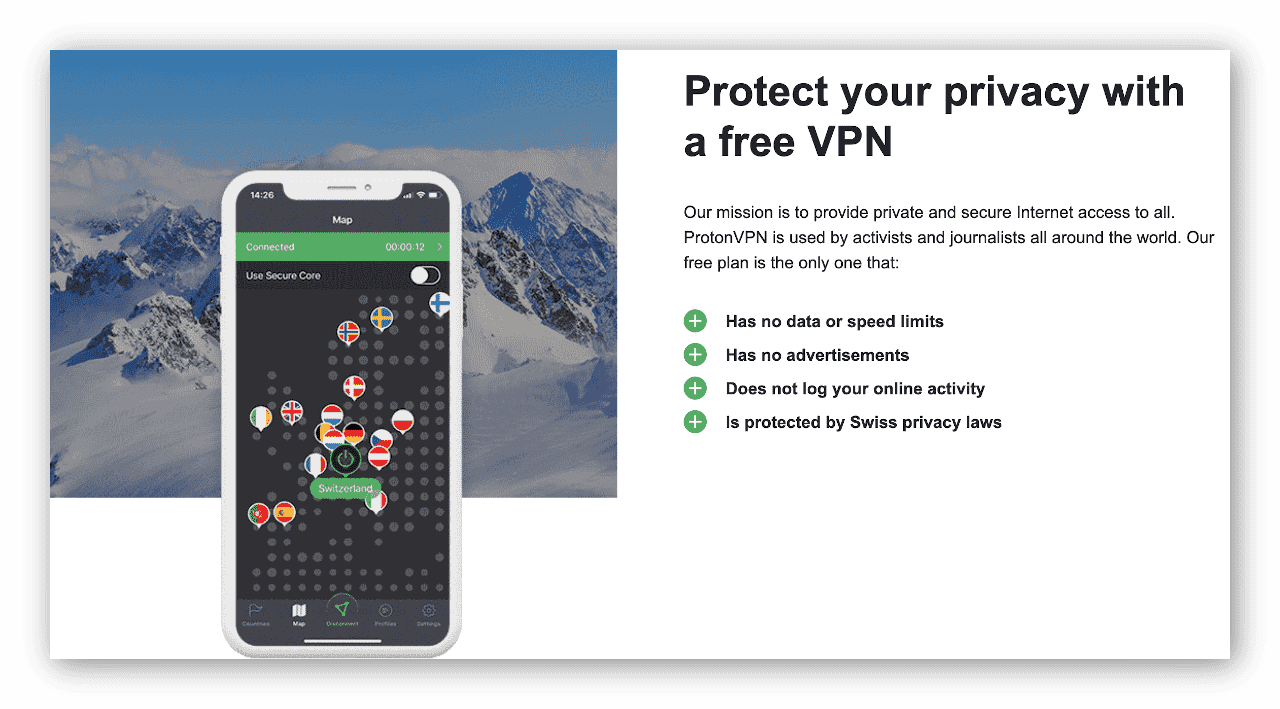
Cellular providers sometimes apply ‘soft’ caps, slowing specific high-bandwidth activities after reaching a data threshold. A VPN can bypass this type of throttling by encrypting your traffic, making it unidentifiable to the provider.
However, if the ‘soft’ cap applies to all traffic, and not just to certain activities, then a VPN won’t help.
SUMMARY: A VPN won’t overcome a ‘hard’ mobile data cap – where your connection is completely cut off once you reach the monthly limit – but it can help you bypass certain ‘soft’ data caps.
Unfortunately a VPN can’t help you avoid data roaming charges abroad. Charges are based on the cell tower location, not your VPN server location.
Here’s how VPNs affect different mobile package restrictions:
| Mobile package restrictions | Does a VPN help? |
|---|---|
| ‘Hard’ cap on the amount of data you can use. | No.
You’ll reach the data cap faster due to VPN overhead. |
| ‘Soft’ cap, where all your bandwidth is throttled after you download 10GB (for example) in a month. | No.
You’ll reach the ‘soft’ cap faster due to VPN overhead. |
| ‘Soft’ cap, where streaming (for example) is limited after the first 10GB. | Yes.
A VPN prevents your mobile provider from identifying streaming traffic, so it won’t throttle your bandwidth. |
| Roaming charges, where you pay to download or upload data in another country. | No.
Charges are based on phone location, not VPN server location. |
EXPERT TIP: For cellular plans with unlimited social media data, avoid routing this traffic through your VPN to prevent it counting towards your general data allowance.
